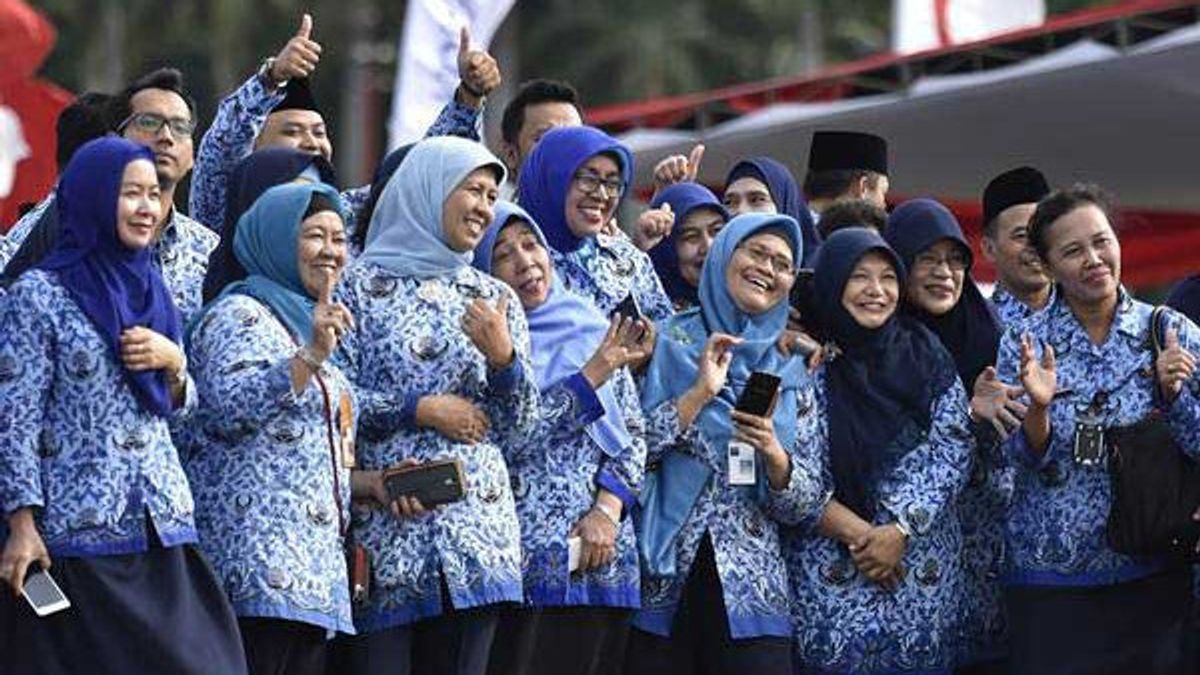LIMAPAGI - Apart from going home, Eid is synonymous with exchanging gifts or parcels. The purpose of delivery is usually to relatives, co-workers to relations.
Basically sending parcels is legal for the general public. However, the exception is for the State Civil Apparatus (ASN) or Civil Servants (PNS).
Parcels or some call them hampers, for civil servants and officials related to the 2022 Eid moment are considered gratuities. Internal appeals in a number of state institutions, State-Owned Enterprises (BUMN) and Regional-Owned Enterprises (BUMD) have clearly stated prohibition points for their workers to receive parcels during the Eid 2022 moment.
Another rule that regulates the prohibition is also contained in Article 5 letter k of Government Regulation Number 94 of 2021 concerning Civil Servant Discipline, namely that civil servants are prohibited from accepting gifts or any kind of gift from anyone related to their position and/or work.
Including Article 12B and Article 12C of Law Number 20 of 2001 concerning Amendments to Law Number 31 of 1999 concerning Eradication of Criminal Acts of Corruption, related to giving or receiving into the category of gratification.
In this article, it is explained that the provision of gratification in a broad sense, which includes the provision of money, goods, discounts, commissions, interest-free loans, travel tickets, lodging facilities, tourist trips, free medical treatment, and other facilities.
The gratuities are received both domestically and abroad and which are carried out using electronic means or without electronic means.

In West Java, the rules regarding the prohibition of receiving parcels are contained in Circular (SE) Number: 73/AR.06.03/Inspt concerning Corruption Prevention and Gratification Control related to Holidays in the Regional Government of West Java Province.
The SE explained that civil servants were prohibited from accepting gratuities in the form of money or gifts such as parcels. If proven to be the recipient of gratification, the ASN is at risk of being subject to ethical and criminal sanctions.
"Civil servants and state administrators are obliged to be good role models for the community by not requesting, giving, and receiving gratuities related to their positions and contrary to their obligations or duties, and not taking advantage of the Covid-19 pandemic or holiday celebrations to commit acts or corrupt actions. These actions can cause conflicts of interest, conflict with regulations/codes of ethics, and have the risk of criminal sanctions, "said in point 2 of the SE.
Meanwhile in Central Java, Semarang to be precise, the prohibition on receiving parcels is stated in the Circular Letter of the Mayor of Semarang Number B/1975/061/4/2022. The regulation was signed by the Mayor of Semarang, Hendrar Prihadi, on April 22.
Chairman of the State Civil Apparatus Commission (KASN) Agus Pramusinto emphasized that the gift of parcels is one type of gratification so that civil servants are obliged to refuse it.
"The gratification is when we receive something related to duties and positions. So at any moment, including the Eid moment, we cannot accept it," Agus said in a written statement received by VOI, Sunday 1 May.
Sanctions for Civil Servants or Officials Reckless to Receive Parcels
If any ASN persists in accepting Eid parcels from anyone related to their position and duties, they may be subject to severe disciplinary action. The punishment is regulated in Article 8 paragraph (4) of the Government Regulation concerning Civil Servant Discipline.
Sanctions are also in the form of criminal threats as stipulated in Article 12 B of the Anti-Corruption Law. It reads as follows: Civil servants or state officials who are proven to have received gratification can be sentenced to a minimum of 4 years in prison and a maximum of 20 years in prison and a minimum fine of Rp. 200 million and a maximum of Rp. 1 billion.
However, what if a civil servant or official cannot refuse a parcel addressed to him at one time?
Civil servants or officials who under certain circumstances cannot refuse Eid parcels can report them to the Gratification Control Unit (UPG) in their respective agencies accompanied by documentation of delivery.
Reports can also be submitted to the Corruption Eradication Commission (KPK) no later than 30 working days after the parcel was received. The reporting process is not difficult, civil servants or officials receiving parcels can access the official KPK website, namely: https://gratt.kpk.go.id.
Another step is to contact the KPK's public information service at telephone number 198. The mechanism for reporting gratuities is stated in Article 16 of Law Number 16 of 2002 concerning the KPK (KPK Law).
However, citing the book Getting to Know Gratification published by the KPK, there are a number of forms of acceptance of gratuities that are not required to be reported by the KPK, namely:
1. Giving due to family relationship, as long as there is no conflict of interest;
2. Gifts (signs of love) in the form of money or goods that have a selling value in organizing weddings, births, baptisms, circumcisions, teeth cutting, or other traditional/religious ceremonies with a limit of value per giver in each event a maximum of Rp. 1,000,000;
3. The gift is related to a disaster or disaster experienced by the recipient of the gratuity at a maximum of Rp. 1,000,000 per gift per person;
4. Giving to fellow employees in the context of greetings, promotions, or birthdays that are not in the form of money or not in the form of cash equivalent of a maximum of Rp. 300,000 per gift per person with a total gift of Rp. 1,000,000 in one year from the same provider;
5. Gifts to fellow co-workers are not in the form of money or not in the form of cash equivalents (cheques, shares, credits, etc.) a maximum of Rp. 200,000 per gift per person with a total gift of Rp. 1,000,000 in one year from the same provider;
6. Generally accepted dishes or offerings;
7. Academic or non-academic achievements which are followed at their own expense, such as championships, competitions or competitions not related to service;
8. Profit or interest from fund placement, investment or private share ownership which is generally accepted;
9. Benefits for all participants of employee cooperatives based on general membership of civil servants cooperatives;
10. Seminar kit in the form of a set of modules and stationery as well as certificates obtained from official official activities such as meetings, seminars, workshops, conferences, training or other similar activities generally accepted;
11. Receipt of gifts or allowances in the form of money or goods related to the improvement of work performance given by the government in accordance with the prevailing laws and regulations; or
12. Obtained from compensation for professions outside the service, which are not related to the main duties of the official/employee, do not have a conflict of interest and do not violate the internal rules of the institution receiving the gratification.
The English, Chinese, Japanese, Arabic, and French versions are automatically generated by the AI. So there may still be inaccuracies in translating, please always see Indonesian as our main language. (system supported by DigitalSiber.id)









